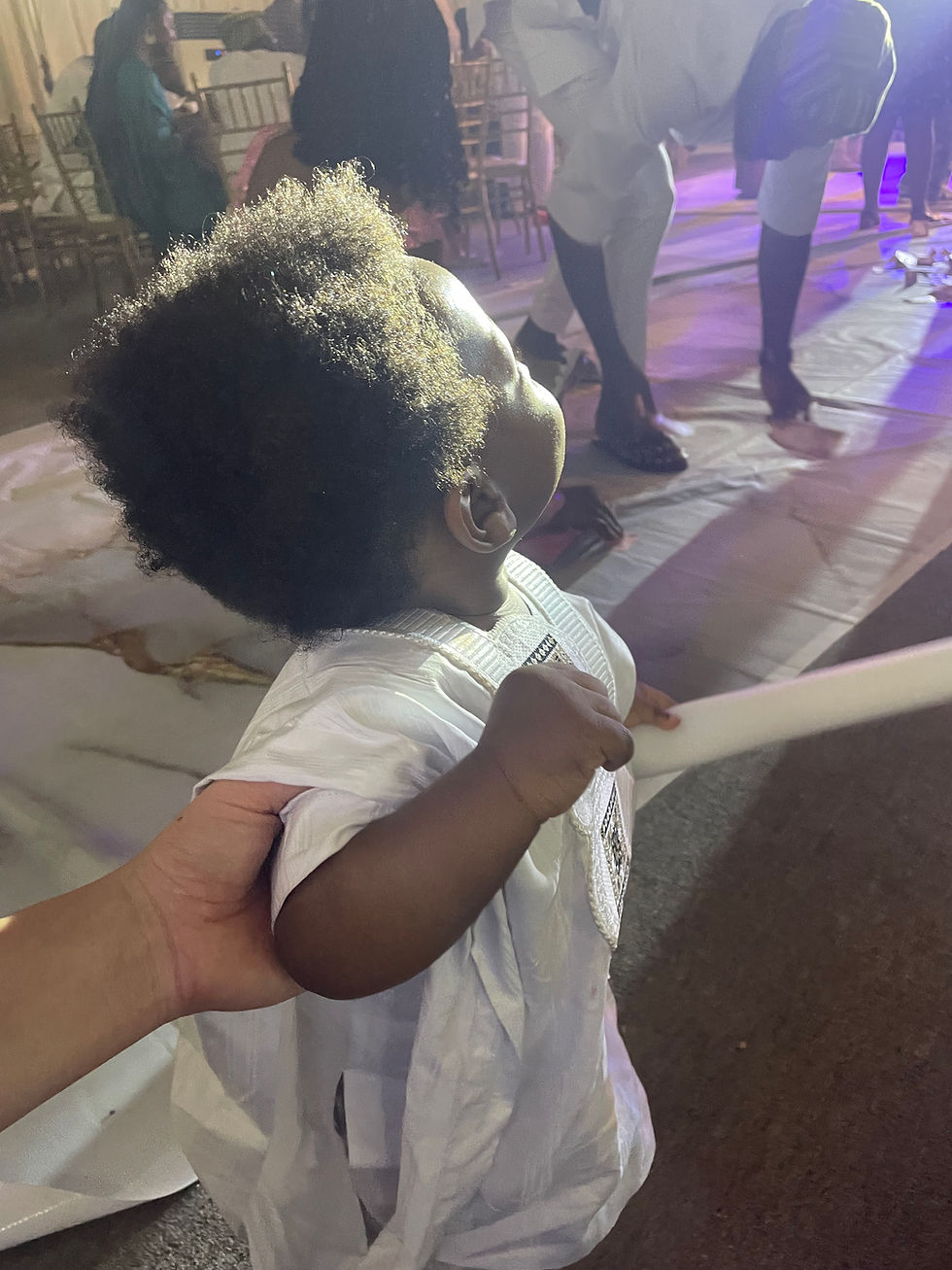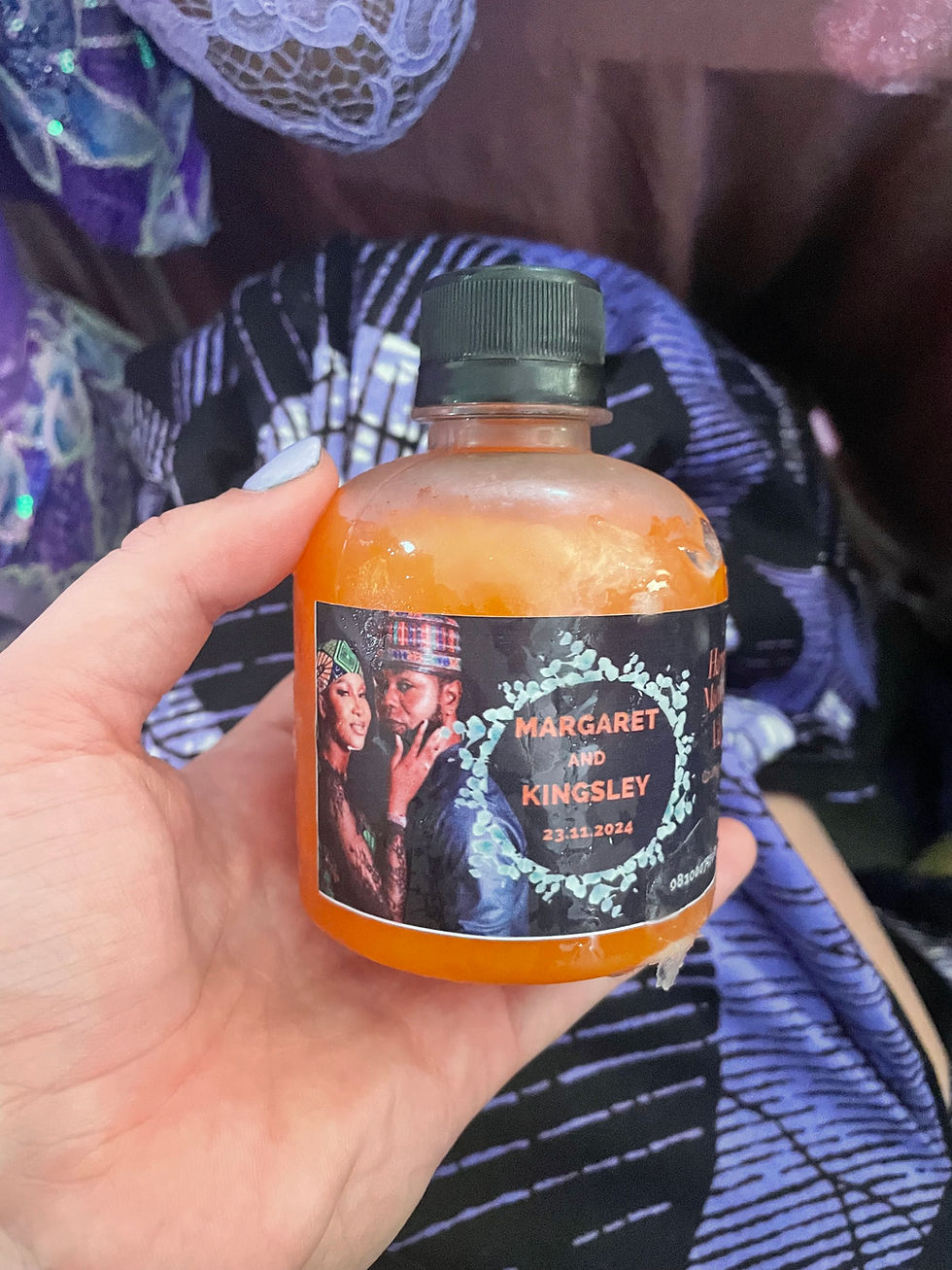The most special day: a Nigerian wedding
- Snippets of Reality Author
- 26. Nov. 2024
- 6 Min. Lesezeit
Aktualisiert: 3. Dez. 2024

I’m opening the door of the Uber and feel how my tight dress restricts my movement as I try to get my first leg out of the car. As I wrap myself out, a big white tent presents itself in front of me. Happy to not to be wearing heels, I make my way through the bumpy and dusty parking lot towards the entrance. Surprisingly, the party has already begun. Big round table fill the hall abundantly decorated with flowers, glass, gold and silver. No inflationcould dim the grandeur of this event. I am guided to a table where four women, all dressed in the same fabric as mine, are awaiting me. It’s my colleagues. For the first minutes, I can’t stop myself from just looking around and taking in every detail of this extravagant celebration. Every table is surrounded by vibrant, glittery gounts, tightly wrapped enhancing the curves of each body. Most women wear hair wraps that are folded into a zigzag pattern, creating the silhouette of a queen with a crown. Each group of guests was given matching fabrics to create their own unique dress design with a personal tailor. Most men wear the traditional Agbada, a big gown that makes them appear with wide shoulders. It is a tunic that reaches to the knee, paired with matching trousers, both made out of rich fabric.
Somebody hands me a paper cup filled with Nigerian snacks. A samosa, spring roll and two sweet puff-puffs are soaking the paper with oil. As I bite on the crunchy dough, the blasting music suddenly stops and the MC steps on stage again. He gives a special welcome to a governor of a state that is attending the wedding who is now joining him. The couple that is seated on an elevated throne behind the stage makes its way to him. The bride is wearing a voluminous white western-style dress that

consumes two meters of space around her. They dance together for a bit and other people join them. Some people throw 200 Naira bills on the bride. The governor is handing big bundles of currency to the bride as she dances. Afterwards, two people with professional lights run on the stage to prepare the setting around the couple for the photographer to take a picture. This scenario will repeat itself with all kinds of important guests, different parts of family and friends during the next two hours.
After another round of dancing with the married ones ends, I observe four women grabbing the baskets parked on the side of the dancefloor, collecting the bills that have covered the ground. Another woman joins them with big plastic bags into which the full baskets are emptied. The custom of throwing money on the bride depicts metaphorically almost too bluntly the important role that money plays for any relationship in this country. In a society marked by economic instability and inequality, financial standing is often just as important as a personal connection itself. The bride returns to her seat in a new dress, her skin-toned tight gown is covered in magnificent beads arranged in an intricate pattern.

As I sip my alcohol-free cocktail, tuning out the MC’s perpetual announcements, I suddenly hear my name, I look up, confused, and share a questioning glance with my colleague.
“You’re asked to join a game” she explains. Timidly I make my way to the stage after my fourth invitation that I couldn’t overhear anymore. This has put an end to my strategy of maintaining a low profile and not standing out as the only foreigner in a crowd of a few hundred Nigerians. After running around and collecting items for the game, I drop out and watch the other contestants battling for the win. The last item they have to find is a wig. The crowd bursts into laughter when the only man left, dressed in a traditional attire enters the stage, sits down and proudly raises a wig into the air. It’s an unexpected picture and we all join the laughter.
A group of men enters from a side entrance next to me and the workers immediately fix the seating situation by placing a new table and decorating it within seconds. The uncommon rapidity of service becomes clear when they sit down, and three security men place themselves around the table. It seems like more guests from the high society have joined us.
At my table we are finally served the main dish: of course it is jollof rice, the unofficial national dish alongside another type of rice and a piece of beef. I take a spoonfull of jollof pleasantly awaiting its spicy, tomatoey and peppery taste to fill my mouth. Instead, my face contorts, and I struggle to swallow. “It’s so fishy!” I scream. My colleague laughs “It must be an Igbo cook from the south. They love to add crayfish powder to everything”.

I check my phone and stumble upon the bride’s Whatsapp story from the day before. She is wearing a traditional gown, dancing bear foot on a mud square, surrounded by a large group of family. It was the traditional wedding in her hometown led by a tribal leader. This morning, they went to church for the religious approval of the marriage, and now, in the big party, they are presenting themselves as a married couple to the society. And it is clear that I am currently attending an event of the Abuja high society by the number of important people that are being part of it. While another batch of pictures with the couple is being taken and the floor is emptied of bills one again, we’re handed a bottle of juice, branded with the official picture of the bride and groom. Branding is everywhere- people are writing in notebooks adorned with the couple’s names and wedding date or drinking from decorated bottles.

It is half past five and the MC announces the official part of the wedding is concluded. Very directly he asks the older generation- people above 50- to leave the place. For the next thirty minutes, people change outfits, make phone calls outside and service workers start clearing some decorations. My colleague who invited me to this, her sister’s wedding joins our table and we start dancing a bit, getting ready for the afterparty. She steps away to check on her baby, and I look at my phone. I am pulled from my thoughts when somebody taps on my shoulder. I spin around and look into an unfamiliar face. It’s a man wearing sunglasses and white outfit. His tunic which matches his pants, is adorned with shiny, glittering stones in the shape of a lion’s head. He’s part of the group of men with the security guard that all wear a similar glittery decoration on their shirts. “Ankara looks good on you, beautiful” he compliments my traditional dress. I can’t help but laugh to myself. How could I have thought I would remain unnoticed after all this time? I quickly explain that I’m here with a colleague and walk away to find her. As I cradle her baby on my lap, the music changes and the groom and bride appear at the entrance. She is now wearing a sexy, short, red jumpsuit, and I start to understand why the older and traditional generation was asked to leave befor. They shoot their firework cannons while the make their way to the dancefloor cheered upon by the young crowd.

The appearance hasn’t ended yet. The MC asks the couple to perform a lapdance for each other. And without hesitation, the groom sits down in a chair, eyes fixed on his wife ash she dances sensually in front of him making her way to sitting on his lap. After this impressive performance, the young friends and family crash the dancefloor and the volume of the afro beat songs hit another level. I find myself dancing with the bridesmaids and my colleague when the same man approaches me again. I have to ask him to repeat himself three times, the combination of the loud music and his accent making it hard to hear. “I told you that I am interested in you”, I finally understand. Since I am not, I tell him that I am engaged. It's a little white lie I’ve perfected over time. In moments like these, I’m reminded that, even with western-style wedding dresses and lapdances for husbands, tradition still deeply structures this society. Marriage here is more than love; it’s status, respect, and sometimes a shield. It simultaneously devalues unmarried people, reducing their worth in the eyes of society. But I also learned that there are people who think differently – who challenge these traditional norms and create a fulfilling life outside of marriage.
I smile as I join the bridesmaids on the dancefloor, most of whom are as single as I am. Together, we celebrate the evening, the music, and each other’s company. We dance free heartedly in a way that feels free of expectations, at least for a while.




Kommentare